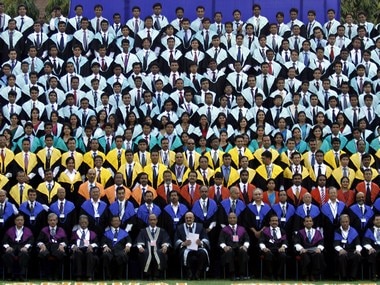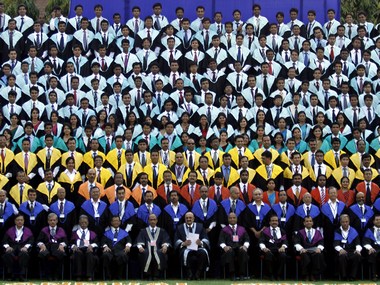In response to a public interest plea furthered by the Gujarat High Court, the Indian Institute of Management, Ahmedabad (IIM-A), a premier educational institution and in middle-class imagination, the doyen of what a university should be, expressed its vociferous reservations against affirmative ‘quota’ in its celebrated Fellow Programme in Management (FPM). The plea, filed by the Global IIM Alumni Network, sought to further a case for “social justice” in education by advocating that IIM-Ahmedabad, like its sister institutions in Lucknow and Bengaluru, apportion a fixed number of seats for applicants from Scheduled Caste (SC), Scheduled Tribe (ST), Other Backward Classes (OBC) categories, as also for students with disabilities – this, the association argued, would make management education more inclusive and diversely variegated, inaugurating a welcome break with the course’s history of educational exclusion from its inauguration in 1971. Commenting on his alma mater’s stance, Anil Wagde, a member of the alumni network, said, “IIM Ahmedabad has no respect for the constitutional spirit of social justice. Other IIMs are giving reservation in the fellow programme. The stand taken by IIM Ahmedabad is a violation of the law.” [caption id=“attachment_98717” align=“alignleft” width=“380”]  Students and faculty members of Indian Institute of Management (IIM) attend their annual convocation ceremony at Ahmedabad. Reuters[/caption] The FPM, to understand first the course programme, is a pre-doctoral preparation for the writing of a doctoral thesis, and is, to that end, a research programme in configuration, beginning with a research question on a critical matter of management and culminating in an exposition on its engagement. It has remained an illustrious programme peopled by the illustrious. In its research-concentration, it has delivered students and researchers to academic and research positions in universities and industrial faculties. In its rejection of ‘quota,’ the university has certainly made an affront against social justice, but there is something more substantial, and in that, more insidious in the rhetoric that the university itself has used in its defence. IIM-A’s objections to the proposed reservations are, at one level, merely logistical. In that vein, the university has expressed its inability to earmark a certain number of positions in the course because of the course’s fundamentally ad-hoc nature – “FPM is not like a regular programme at any university where certain seats are fixed and they are filled by regular tests,” so it goes, “there are no fixed numbers of seats for the FPM course at IIM Ahmedabad…. Without fixed seats, it is impossible to provide for reservation of fixed seats for any category of social strata.” In a more problematic restatement, however, the university made two comments. First, that although skeletally a government institution, the university is no longer publicly funded, having become self-sufficient in fiscal function, and so divested of the public responsibility of obeisance to constitutional structures and provisions. This is an appalling statement, unmindful not only of the avowed universality of constitutional vision but the pre-history of the IIM as a publicly instated and propelled institution – while the IIT was born of Nehru’s grandiose conception of technology as an ornament of modern aspiration, the IIM was sired from practical and however self-construed, noble considerations of constructing an able intelligentsia to ‘manage’ the nation’s rapidly developing public economy. Whatever one’s problems with Nehru’s visions and misdeeds, education finds itself today in debilitating times of hollow institutional vision. The university of contemporary India is besieged from two ends – first, from a government violently intolerant of students unwilling to be unthinking subjects, and second, from an economic structure whose primary, and only, interest in education is in the generation of a faithful workforce and whose bidding the IITs and IIMs have willingly lapsed to do. It is interesting that IIM-Ahmedabad should surrender its veneer of public education at this political juncture, for public universities across the country are, at precisely this juncture, confronting the spectres of an impending privatisation which would, whether they are able or otherwise, force educational institutions towards a self-sufficiency from government endowment. In this process of falling against itself and its own feet, academics and activists of public universities have asserted, educational institutions will have to evolve new avenues of funding, heralding the possibility of education becoming a private luxury for private individuals who can afford to enjoy it. The stories of public universities as emancipatory sites for the marginalised, reiterated year after year, are an effort to compel the citizenry into democratic realisation. Evidently, we are not listening. IIM-A’s second statement deserves some consideration, for it is an exercise in self-reflection. “It may kindly be appreciated,” the report tells us, “that neither the Constitution of India nor any law envisages reservation for courses/programme at high level of specialisation. Even the candidates from reserved category, by the time they reach the stage of applying for programme such as FPM, would have had the benefit of reservation policy in education at graduation and PG (specialisation) level courses. Therefore the law does not mandate any further reservation in high-level specialisation programmes,” said the affidavit filed in court by IIM Ahmedabad director Errol D’Souza.
D’Souza argued that for the FPM the IIM seeks candidates with an outstanding academic background, intellectual curiosity and discipline needed to make a scholarly contribution.
Such a statement in instructive in reading what, or who, can be from an “outstanding academic background”, be intellectually curious and disciplined, and more fundamentally, “make a scholarly contribution.” One dubs this as a call for self-reflection for it militates against the afore-developed case for the public university as only a site of emancipation for subaltern groups, revealing its deep fractures and ancient prejudices. The public university, even before liberal economic change, emerges from this encounter as a place of prejudice and exclusion, treating some of its constituents of caste and class with tragic alterity. As ‘Dalit’ narratives on media of the internet recount in reflection after reflection, this remains an unchanged template. To oppose IIM-Ahmedabad’s rejection, thus, is a more difficult critique than one imagines, for it spares no entity – not even the public university. Yet, at its barest essentials, it remains a case for a public university, and more critically, particularly in terms of privacy and the celebration of being private, of a public individual.


)

)
)
)
)
)
)
)
)



